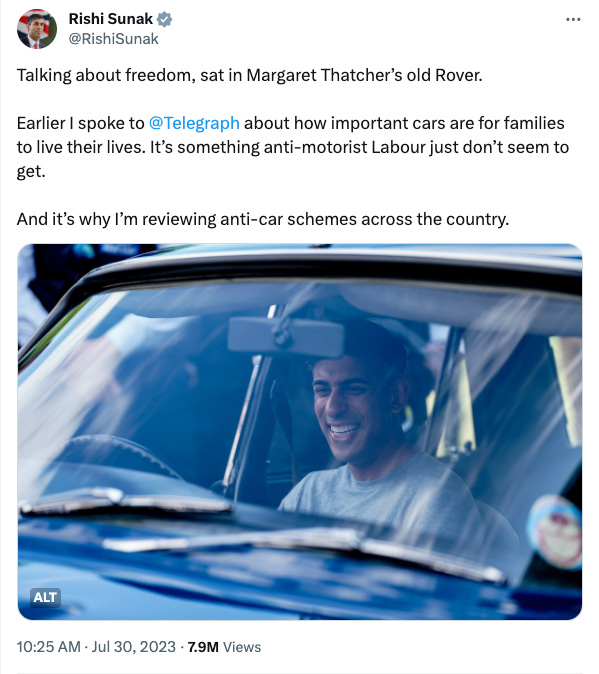The war on war on cars
Conservatives across the globe think siding with the automobile is a big winner
After a sluggish year in the polls, Tory British prime minister Rishi Sunak is championing a new cause: the automobile. Sunak says he is “slamming the brakes on the war on motorists” and “hare-brained” schemes that don’t “reflect the values of Britain.” The schemes at issue include a 20mph speed limit in Welsh villages and town centers; residential streets with reduced traffic flow, known in the UK as “low traffic neighborhoods” or LTNs; and the general urban design concept of 15-minute cities, in which neighborhoods are drawn up so that people live within an easy 15-minute walk or bike ride of most essential needs, like groceries and healthcare.
Sunak’s motor enthusiasm emerged this summer after the Tories hung onto a parliamentary seat they were widely expected to lose in outer London. Conservative Steve Tuckwell narrowly won in Uxbridge by running a single-issue campaign against the expansion of the Ultra Low Emission Zone, or Ulez, which charges drivers £12.50 a day if their cars don’t meet emissions standards. The zone expanded on August 29 to all London boroughs, an additional 5 million people. The Ulez is a clear environmental success—credited with slashing nitrogen oxide emissions and fine particulate matter (PM2.5) in London—but is unpopular with vehicle owners forced to pay the daily charge or purchase a new, emissions-compliant car.

Sunak isn’t the only one to swerve this way lately. The war on war on cars is an increasingly popular conservative platform. Politico reports Europe is facing a cycling backlash, with conservative politicians across the continent encouraging an automotive culture clash that they believe puts them on the side of working-class drivers. In Berlin, the newly elected conservative local government has paused all bike infrastructure projects that “endanger” existing car lanes and parking, as well as reversed plans to pedestrianize a major boulevard. (Stockholm, on the other hand, plans to ban petrol and diesel cars from 20 blocks of the city center from 2025.)
Meanwhile in the U.S., the United Auto Workers strike against Detroit’s Big Three automakers has inflamed tensions around electric vehicles. Workers are seeking to secure their wages and working conditions in the new electric industry. President Biden, whose administration has bet big on EVs, made an unprecedented appearance on the picket line, while Donald Trump and his fellow Republicans have derided the electric transition. At least seven GOP-controlled states have raised fees on EVs in a move critics say is designed to stunt sales. House Republicans over the summer pushed to limit the Pentagon’s use of electric vehicles and block Biden’s proposed emissions standards. Back in January, a group of Republicans in Wyoming even introduced a bill aiming to phase out the sale of EVs entirely.
People get emotional about their cars, making them potent culture war fodder. Car ownership in the U.S. is deeply embedded in the mythology of the American dream. Cars are the heroes of classic American films, a coming of age rite for teens, and an enduring symbol of freedom, independence, and social mobility. Even without the emotional ties, decades of urban and suburban sprawl development, combined with sustained underinvestment in public transport and rail infrastructure, mean life without a car for a huge number of people simply isn’t an option. There are a lot of places where if you want to get somewhere, you have to drive. Reducing automotive reliance might be a goal in some of these places, but it’s also clear that cars aren’t going anywhere anytime soon.
The war on war on cars, like most culture wars, aims to flatten these complexities into a single and maximally inflammatory position. Those crazy liberal environmental fanatics! They are coming for your cars, every last one! They would rather you go nowhere than anywhere at all! They hate freedom! They hate choice! They will unleash armies of cyclists on the streets to ram you off the road! They will build ramparts of groceries and local shops and force you to walk there instead of driving 10 minutes to Costco!
Different places require different policies and strategies. The Ulez makes sense in central London because of the city’s density, congestion, and robust public transport network. It would make much less sense in a rural or spawled area with limited to no public transportation and high reliance on private vehicles. Policies like congestion pricing, the Ulez, low-traffic neighborhoods, and cycling infrastructure aren’t one-size-fits-all solutions, they’re tools in a vast and growing kit for tackling emissions, congestion, and the other negative effects of an over-reliance on cars. These policies are hugely important to our future—to creating greener, resilient, and more liveable cities. They also aren’t a panacea. If we’re removing cars from certain places, we have to make sure the people who live and move around there have other options for getting where they need to go. We should take measures to ease what is bound to be a difficult transition, especially for the most vulnerable. We should understand that change is hard and takes time to adjust to, and approach it with patience and empathy. The war on war on cars doesn’t want to have these conversations, though. It just wants to get mad about it.




